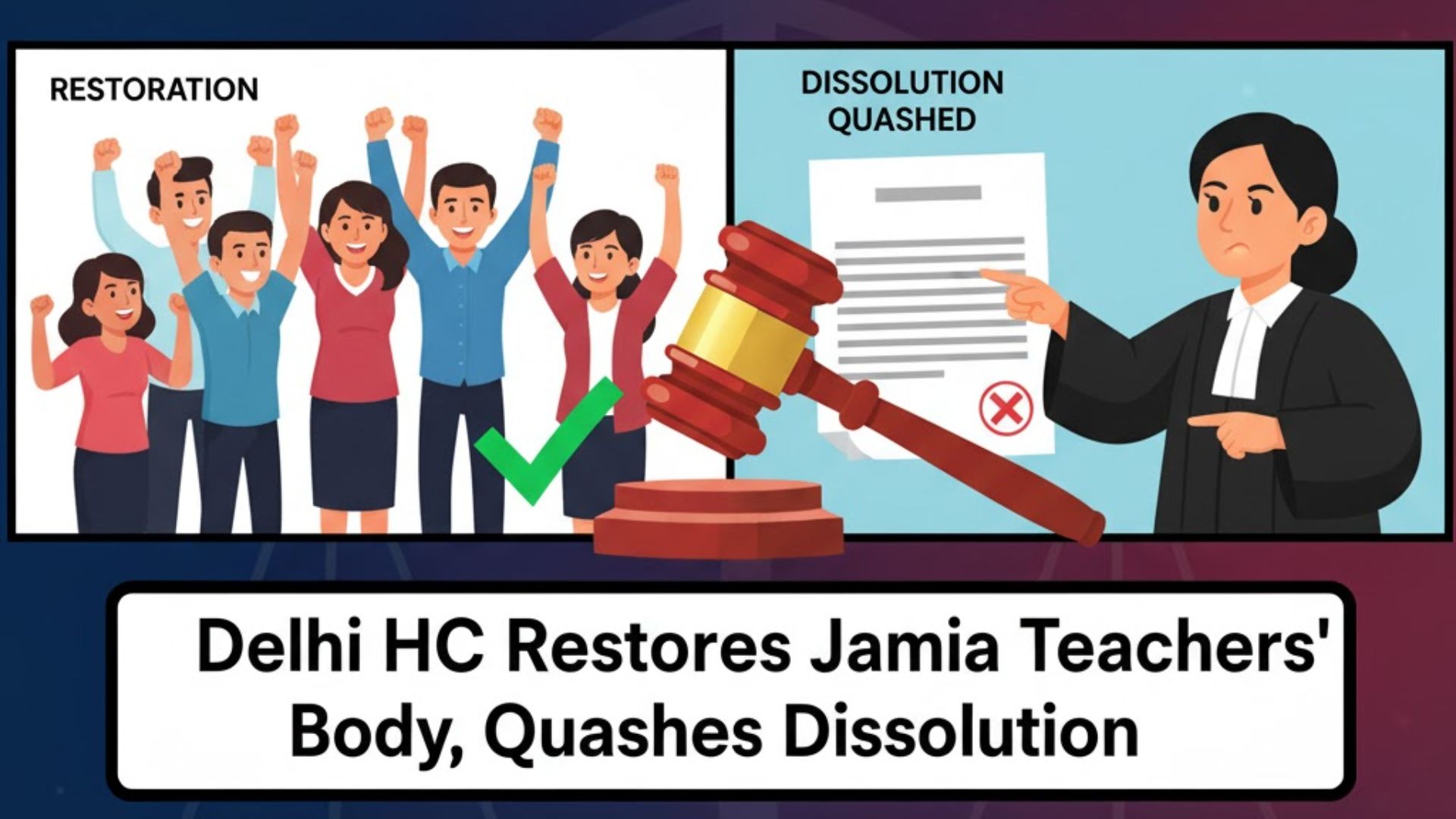
Delhi High Court Restores Jamia Teachers’ Association, Quashes University’s Dissolution Orders
Court says Jamia’s move violated teachers’ fundamental right to association
Ruling strengthens autonomy of teachers’ bodies in universities across India
By Our Legal Reporter
New Delhi: October 29, 2025: In a landmark judgment, the Delhi High Court has quashed Jamia Millia Islamia University’s 2022 orders that dissolved the Jamia Teachers’ Association (JTA), sealed its office, and barred its office-bearers from using association funds and premises. Justice Sachin Datta ruled that the university’s actions were unconstitutional and violated the teachers’ fundamental right to form and continue associations under Article 19(1)(c) of the Constitution.
The Court emphasized that the right to association includes not only the right to form an organization but also the right to continue its existence with its chosen leadership and internal governance.
Background of the Dispute
- In November 2022, Jamia Millia Islamia issued orders dissolving the JTA, citing alleged irregularities in the appointment of a returning officer for elections.
- The university also sealed the JTA office, froze its finances, and prevented members from holding meetings.
- The JTA challenged the orders in the Delhi High Court, arguing that the university had no authority to dissolve an independent teachers’ body.
Court’s Key Observations
Justice Datta made several important findings:
- Violation of Article 19(1)(c): The university’s orders infringed the teachers’ constitutional right to association.
- No valid grounds under Article 19(4): The Constitution allows restrictions on associations only for reasons like sovereignty, integrity, or public order. None of these applied in this case.
- Autonomy undermined: The university’s unilateral attempt to impose a revised constitution on the JTA without consulting members was unconstitutional.
- Administrative overreach: The dissolution orders were administrative in nature and lacked any reasonable justification.
Teachers’ Association’s Stand
The JTA argued that:
- It is an independent body formed by teachers, not a department of the university.
- The university cannot interfere in its internal elections or governance.
- Dissolution of the association was an attempt to silence dissenting voices among faculty.
University’s Argument
Jamia Millia Islamia contended that:
- Since the JTA was formed under the Jamia Millia Islamia Act, 1988, the university retained supervisory powers.
- The dissolution was necessary to address alleged procedural violations in elections.
The Court, however, rejected these arguments, holding that reference to the JMI Act only provided a statutory backdrop and did not give the university authority to dissolve the association.
Wider Implications of the Judgment
This ruling has far-reaching consequences for academic freedom and teachers’ rights in India:
- Strengthens autonomy: Teachers’ associations in universities across the country can rely on this judgment to protect their independence.
- Limits administrative control: Universities cannot arbitrarily dissolve or restructure associations.
- Boosts democratic governance: Teachers retain the right to elect their representatives without interference.
Expert Reactions
- Legal experts hailed the judgment as a strong reaffirmation of constitutional freedoms.
- Teachers’ unions across India welcomed the ruling, saying it protects faculty voices in academic governance.
- Education activists noted that the decision will encourage more democratic functioning within universities.
Past Precedents
The Supreme Court and High Courts have previously upheld the right to association in cases involving trade unions, student unions, and professional bodies. This judgment extends the same principle to teachers’ associations in universities, reinforcing that they cannot be dissolved by administrative fiat.
Conclusion
The Delhi High Court’s decision to restore the Jamia Teachers’ Association is a major victory for academic freedom and democratic rights. By striking down the university’s dissolution orders, the Court has reaffirmed that teachers’ bodies are autonomous associations protected by the Constitution.
This ruling not only restores the JTA but also sets a precedent for safeguarding the independence of teachers’ associations across India’s higher education institutions.
ALSO READ POPULAR ARTICLES
-
Supreme Court Halts GST Assessment on Joint Development Deals
-
Supreme Court Explains Demurrer Law in Neelkanth Realty Case
-
Supreme Court Opens Door for Vodafone Idea Relief in AGR Case
-
Delhi High Court Rules No Alimony for Financially Independent Spouse
-
Akshay Kumar Moves NCLAT Against Edtech Firm Over ₹4.83 Cr Dispute
-
SC Quashes Chhattisgarh Tender Clause Favoring Local Bidders
-
SC to Examine Validity of Securities Transaction Tax on Trading
-
SC Defers Vodafone Idea ₹5,606 Crore AGR Dues Hearing to Oct 13
-
Punjab & Haryana HC: Bail Can’t Be Cancelled for Seeking Hearing Exemptions
-
Delhi HC Protects Mankind Pharma’s ‘Kind’ Trademark, Bars Similar Names
-
Delhi HC Appoints Justice Rajiv Shakdher as Arbitrator in Playboy Bar Dispute
-
Karisma Kapoor’s Kids Challenge Sunjay Kapur’s Will in Delhi HC
-
SC Questions Dual Madras HC Hearings, Reserves Verdict on TVK Plea
-
SC Lets Judicial Officers With 7 Years Bar Apply for District Judge
-
SC to Hear Vijay’s TVK Plea Against SIT Probe in Karur Stampede
-
SC Probes Financial Irregularities in Indiabulls Housing: ED
-
Delhi HC Quashes 22-Year-Old Case Against Lawyer Over Basement Office
-
SC Seeks Rehab Plan for Cadets Injured During Military Training
-
SC PIL Seeks CBI Probe, Nationwide Review on Cough Syrup Deaths
-
Delhi HC Hikes Land Compensation for Yamuna Project Villagers
-
Punjab & Haryana HC: Bail Can’t Be Denied Over No Permanent Home
-
SC: Appellate Courts Can Correct Trial Court Evidence Errors